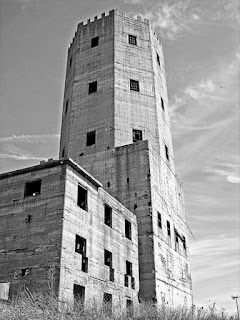The first image is a 3D Satellite view of a former headhouse for a grain elevator in Harvey, IL. The second image is from a 1938 aerial photo that shows it used to have ten bins. The railyard is along a GTW route that is now owned by CSX because they bought it from CN. The tracks along the left side of that image were for the IC, and they are now owned by CN.
 |
| 1 3D Satellite |
 |
| 2 1938 Aerial Photo from ILHAP Dennis DeBruler commented on a post It was the headhouse for the grain elevator. They did tear down the bins that were still standing in this 1938 aerial photo. Grain elevators and coaling towers are examples that concrete, if done correctly, can last a long time. |
 |
| Michael Brandt posted Two previous mills burned to the ground before they built the indestructible castle mill we call Bums Castle in Harvey. |
I learned of this elevator from the following post.
 Jacob Diorio posted
Jacob Diorio postedCSX 4307 heads west under the IC at Harvey with Y126, about to get on the Chicago Heights Sub at CJ. 4307 is a rare bird, being an ex-RDG GP39-2. 2/11/21
The cars on this train were supposed to go to LB Steel in Harvey and Quality Metals in Dixmoor but all the switches were completely snowed over.
What was the octagon tower in the background?
Jacob Diorio: Dennis DeBruler used to be a grain elevator served by the IC. Not too much is known about it but nowadays it’s nicknamed the “Hobo Castle”
John Diorio sent me two more photos:
 |
| 1 |
 |
| 2 |
 |
| Michael Brandt posted A great shot of Bums Castle in Harvey, the old Grainery still stands. |
 |
| Jacob Diorio posted CN Z149 goes west up the north wye at West CN Junction in Harvey, as viewed from about halfway up the IC embankment. The star of the show was the CN 8952 in Burdakin Blue right as the sun was setting. 3/4/21 Bill LePinske: I worked on the GT in late 70’s and the city of Harvey had plans to demolish this cement tower and after they gave it a half dozen hits with a wrecking ball they packed up their equipment and said the hell with it ? They never even phased it ? |
 |
| Chuck Roth posted Here is a shot of a GT yard shed in Harvey along the Elsdon sub with the iconic castle elevator in the background. Adam Powell: I've always wondered what that was. |
 |
| Dennis DeBruler commented on Adam's comment There was a recent discussion in this group. |
 |
| Michael Brandt posted From 1907 it's another Harvey postcard from Bill Robinson looking at the industrial district, taken atop the Harvey Grain Company. You can tell it's the second wooden mill which also burned like the first one did in 1905. Then they built the indestructible castle mill that still stands. Paul F. Barkley Sr: What direction are we facing? Michael Brandt: Paul F. Barkley Sr Southwest you can see the IC tracks to the right, you can even see the IC station almost all the way to the right a little more than half way up. |

I grew up in Harvey in 1941-1960. I climbed the old grain elevator many times, starting about 1953 or 54. There were a couple of brick silos, that have since been demolished, that were the starting point. All of the kids used to say that the metal thing on the very top was an anti-aircraft gun from WWII. Turned out when we climbed to the top, that it was the framework from an old sign. I went to the site many years later and there was no way that I would have climbed that again for any amount of money.
ReplyDeleteThanks for posting the great pictures and explanations! I grew up in Dolton and I always wondered what it was.
ReplyDelete